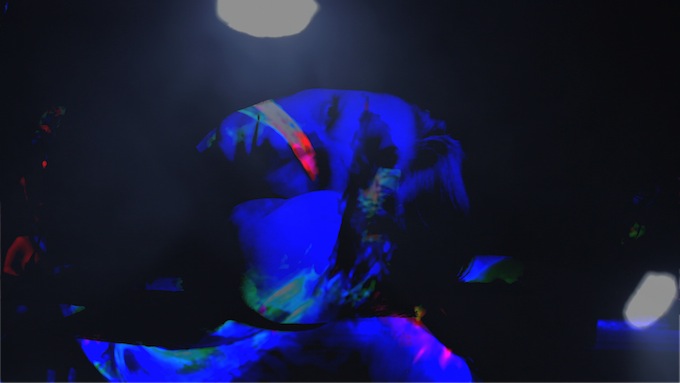
By the end of “A Walk in the Park” ’s 96 minutes, you will know a lot about Brian Fass. You will know of his various ailments, his depression, his relationship with his mother, the medication he is on, the mountain he nearly climbed, his electroshock therapy and the titular walk in the park that marked some sort of turning point in his life. What you will not know, however, is why on God’s green earth you should care. “A Walk in the Park,” from New York indie director Amos Poe premiered today In Competition at the XXI sidebar of the Rome Film Festival, which is a section dedicated to films of all lengths that “reflect the continuous reinvention of cinema in the contemporary audiovisual landscape.” Sad to report, this film reinvents the documentary portrait tradition into a thoroughly confounding and tiresome experience.
A self-consciously meta film that purports from the outset to be a “science fiction film, a psychedelic journey back to the womb,” ‘Walk’ immediately goes about making good on none of those promises. Instead, it's all nervy editing, picture-in-picture, sound overlays, found footage, and interviews done in jittery single-color silhouettes, and its relatively modest running time belies just how gruelling an experience it is for the viewer. Poe’s fascination with avant-garde editing, dubbing and video effects is evident in how he uses every one of them indiscriminately, and often several simultaneously. The result is jarring and difficult to follow at the best of times, and when he throws in a liberal dose of onscreen titling (entire paragraphs of text “write themselves” across the screen, accompanying by clackety keyboard sound effects) over the pictures and sounds of interviewees talking or footage unspooling behind, simply trying to sort out where to look and what to listen to becomes an arduous task. The sources he culls from are painfully on the nose too — want to suggest the creepiness of Brian’s overly close relationship with his mother? Why not use the entire end sequence from "Psycho"! Need some footage to class-up a fleshless beat about Brian’s electro convulsive therapy? “Shock Corridor.” Want some portentous words about madness, depression and self-medication? How about clackety-clacking up this chunk of gloomy prose from everyone’s favourtie manic depressive, Edgar Allan Poe (no relation, we presume).

What’s somehow worse is that as obvious those references are, they are also there for deceitful purpose: to make dramatic and twistedly interesting a story which is just simply not. Fass is undoubtedly a troubled man who was overly coddled by his mother — that doesn’t make him Norman Bates, no matter how much suggestive buzzing-of-flies you put on the soundtrack. If anything, Brian’s story is remarkable because of the level of unquestioned privilege he enjoys. He lives in a 27th floor apartment near Central Park that boasts a heartpounding view over New York City, and is left a $1.3 million fortune by his mother, (of which he is forced to give 30% to the brother his mother had disinherited, which still seems a pretty sweet deal to us). This latter fact clearly accounts for why he apparently does not have to work and can still enjoy constant personal medical attention, two facts which already make him a great deal luckier than a great many other people who suffer from severe psychological and physical problems.
 To be fair to him, Fass does not whine, and comes across less as self-indulgent and more as needlessly indulged by the filmmaker. Indeed, it’s difficult to communicate the utter tedium of the last segment of the film, during which time Brian narrates at great length the cocktail of medication he is on, and how the side effect of one thing led to something that only another thing could cure… Not to be callous, but it’s the kind of conversation you’d forestall if it was your sweet Aunt Mo talking, yet this complete stranger is encouraged to go on and on.
To be fair to him, Fass does not whine, and comes across less as self-indulgent and more as needlessly indulged by the filmmaker. Indeed, it’s difficult to communicate the utter tedium of the last segment of the film, during which time Brian narrates at great length the cocktail of medication he is on, and how the side effect of one thing led to something that only another thing could cure… Not to be callous, but it’s the kind of conversation you’d forestall if it was your sweet Aunt Mo talking, yet this complete stranger is encouraged to go on and on.
To those of us used to the conventions of narrative cinema, the difficulty in approaching more avant-garde works is often that they leave room, sometimes too much room, for personal interpretation, for the viewer to draw their own lines of causality and similarity between people and events. Here, Poe’s instinct is in the opposite direction. He overloads every moment with multiple visual and sonic messages that, taken alone, would be literal and not terribly interesting, but overlaid on top of one another are literal, not terribly interesting and noisy.
Poe, part of the new York '70s punk/art/filmmaking scene that also spawned Jim Jarmusch and Steve Buscemi has said that what he seeks to do here is no less than “re-define the documentary genre, to make it real.” In fact in taking a small, sad, but by no means extraordinary story and attempting to spin it into something epic and flashy and groundbreaking, Poe is guilty of doing precisely the opposite: he drives a thick wedge of pretension and fakery between his hapless subject and those unfortunate enough to be watching. [D]

